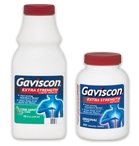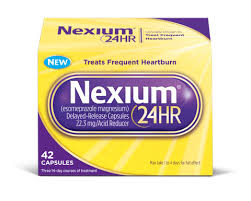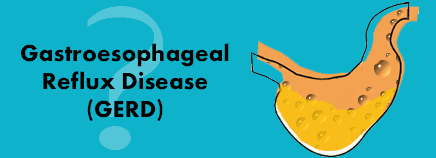Gastric reflux, also known as gastroesophageal reflux disease (GERD), is a condition in which the stomach contents “splash” back up from the stomach to the esophagus. This can cause the esophagus to become irritated causing heartburn and other symptoms. Heartburn is the feeling experienced when there is a burning feeling traveling from the lower chest up toward the neck or throat. Symptoms that patients commonly experience during gastric reflux are a feeling that food is stuck behind the breastbone, heartburn or a pain in the chest, or nausea after eating. Some less common symptoms that may be experienced are bringing food back up (regurgitation), coughing or wheezing, difficulty swallowing, hiccups, hoarseness or change in voice, or sore throat.
Heartburn usually occurs: within 2 hours after eating a large meal or trigger foods or beverages and when bending over or lying down. Triggers foods may include spicy, citrus, or fatty, and trigger beverages may include alcohol or caffeinated drinks. There are three types of heartburn. Simple heartburn is when patients experience mild and infrequent heartburn associated with diet or lifestyle factors. Frequent heartburn occurs more frequently and persistently (lasting at least 3 months); this is the most common type of GERD.
There are several risk factors associated with possibly contributing to heartburn:
- Dietary: alcohol, caffeinated beverages, carbonated beverages, chocolate, citrus foods or juices, fatty foods, garlic or onions, mint, salt and salt substitutes, spicy foods, tomatoes/tomato juice
- Lifestyle: exercise, obesity, smoking (tobacco), stress, supine body position, tight-fitting clothing
- Diseases: motility disorders, peptic ulcer disease, scleroderma, Zollinger-Ellison syndrome
- Medications: aspirin/NSAIDs, clindamycin, doxycycline, iron, potassium, and several others (can check with your pharmacist if you feel that your medication is causing it)
- Other: genetics, pregnancy
Gastric reflux can be treated by several different methods. There are several reasons why someone should consult a physician before trying to self-treat gastric reflux. A person should talk to their physician if they have one or more of the following symptoms: frequent heartburn for longer than 3 months; nocturnal heartburn; difficulty or pain on swallowing solid foods; vomiting up blood or black material or passing black tarry stools; unexplained weight loss; chest pain accompanied by sweating, pain radiating to shoulder, arm, neck, or jaw, and shortness of breath; pregnancy or nursing mothers. For those who are eligible for self-treatment of their gastric reflux, lifestyle/diet modifications can be a beneficial first step in those experiencing mild to moderate and infrequent reflux. These modifications include maintaining a healthy weight, avoiding known food and beverage triggers, avoiding medications known to trigger reflux such as aspirin/NSAIDs, and taking all medications with plenty of water. Other treatment categories include the following:
 Antacids (for children/adults at least 12 years of age)
Antacids (for children/adults at least 12 years of age)
- Alka-Seltzer
- Gaviscon
- Maalox
- Mylanta
- Pepto-Bismol
- Rolaids
- Tums
 H2 Blockers (for children/adults at least 12 years of age)
H2 Blockers (for children/adults at least 12 years of age)
- Tagamet HB
- Axid AR
- Pepcid AC
- Pepcid Complete
- Tums Dual Action
- Zantac
 Proton Pump Inhibitors (for adults at least 18 years of age)
Proton Pump Inhibitors (for adults at least 18 years of age)
- Prilosec OTC
- Zegerid
- Prevacid 24HR
- Nexium
*Patients should follow package directions for correct dose for all medications
Antacids are used for cases of mild and infrequent gastric reflux, sour stomach, and acid indigestion. After using antacids more than twice a week or regularly for at least 2 weeks, the patient should consult their physician if gastric reflux is still occurring. Antacids may interfere with the absorption of some medications, so be sure to check with your physician or pharmacist prior to taking antacids.
H2 blockers are available as both over-the-counter and prescription medications. This class of medication is effective at treating both fasting and nocturnal symptoms. It is best to use these on an as needed basis. They are not as rapidly acting as antacids but do last longer. When being used as an over-the-counter treatment for gastric reflux, they are reserved to be used for mild-to-moderate, infrequent or episodic heartburn. They can be taken at the onset of symptoms are at least 30 minutes prior to an event or meal that is known to trigger the reflux. If this treatment is needed regularly for at least 2 weeks, the patient should consult their physician for further follow-up.
Proton Pump Inhibitors (PPIs) work to relieve heartburn by decreasing gastric acid secretion. It usually takes two to three hours to notice some relief with this class of medication and one to four days for complete symptom relief. PPIs are reserved for patients who have symptoms of gastric reflux at least two days a week. These medications do not provide immediate relief and are best if taken 30-60 minutes prior to a meal. There is a limitation to treatment of gastric reflux with proton pump inhibitors. They should not be used for longer than 14 days and not more often than every 4 months. If symptomatic relief has not been achieved after 14 days or reoccurs more often than 4 months, patients should consult their physician about further treatment.

